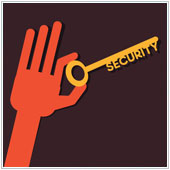 Whether it’s an online account, a computer log in or network access, passwords are used to prevent unauthorized access. But far too many people choose weak and easy-to-guess passwords putting themselves at the risk of cyber attack. Don’t fall into the trap of these cyber criminals. Secure your perimeters and never let anyone access your personal information by following these helpful tips.
Whether it’s an online account, a computer log in or network access, passwords are used to prevent unauthorized access. But far too many people choose weak and easy-to-guess passwords putting themselves at the risk of cyber attack. Don’t fall into the trap of these cyber criminals. Secure your perimeters and never let anyone access your personal information by following these helpful tips.
Observe proper web security
With the rapid advancements in technology comes sophistication of methodologies used by hackers to steal data and destroy web security. Cyber crime is continuously evolving as new programs are made to unlock accounts and combine numbers, letters and special characters to determine passwords. The big question for internet users is – how to choose a strong password that can drive hackers away?
Passwords should have at least eight characters. It is highly recommended that you use a combination of uppercase, lowercase and special characters. “P@s$w0Rd45%” is a thousand times better than “Password1”. Veer away from using passwords that are found in dictionaries. Furthermore, avoid using your name, a family member’s name, phone number, birth date, social security number or any public information. Hackers have found a way to crack passwords with the aid of the many databases out there.
To create even more secure passwords, try using a password that is a full sentence, with random words. For example “I am a purple donkey” (with the spaces) will take a long time to crack, which means it’s more secure then even the examples above.
Keep malware off your system
Malware are malicious programs that have been crafted in such a way that they appear authentic and trustworthy. Be careful not to click on pop-ups and links that will redirect you to that place where your security walls are torn down. And do not open email attachments from anonymous users. Mechanisms are often embedded in these programs to gain control of your system.
Get professional help by installing security software from a trusted name in the industry. Build your defenses as early as possible. Remember the cliché – better to be be safe than sorry – and nowhere is this more true than in computer systems and web security.
Keep your passwords private
While this may seem to be a no-brainer, sadly, a lot of people still tend to share their passwords with their office mates or friends. If you’re one of them, then it’s high time that you change your habits and your password again. Think like James Bond -passwords are for your eyes only.
In the event that you need to give your password to a co-worker to get an important document or presentation, make sure that you change them as soon as possible. Never use the same combination again.
Change password regularly
It also helps if you schedule a regular password change. Within a period of 30 to 60 days, you should update passwords across multiple sites. Moreover, never use the same passwords for different websites. If you use the same passwords, you are putting all of your accounts at a high level risk. Hackers are relentless. Once is never enough for them and they can come back time after time.
It’s an unsafe online world out there. These online troublemakers will never be satisfied. So never let yourself or your organization fall prey to hackers. Take note of these safety measures and strengthen your web security arsenal.